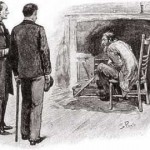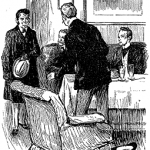“But really, major—”
“Sure you are tired out and need a little rest.”
He held the door open so persuasively that she yielded. It was a snug little room, somewhat retired from the bustle, with two or three chintz-covered chairs scattered round it, and a sofa of the same material at one side. The widow sat down at one end of this sofa, and the major perched himself at the other, looking even redder than usual, and puffing out his chest and frowning, as was his custom upon critical occasions.
“Do light a cigarette?” said Mrs. Scully.
“But the smell?”
“I like it.”
The major extracted one from his flat silver case. His companion rolled a spill and lit it at the gas.
“To one who is as lonely as I am,” she remarked, “it Is a pleasure to feel that one has friends near one, and to serve them even in trifles.”
“Lonely!” said the major, shuffling along the sofa, “I might talk with authority on that point. If I were to turn me toes up to-morrow there’s not a human being would care a thraneen about the mather, unless it were old Von Baumser.”
“Oh, don’t talk so,” cried Mrs. Scully, with emotion.
“It is a fact. I’ve kicked against me fate at times, though. I’ve had fancies of late of something happier and cheerier. They have come on me as I sat over yonder at the window, and, do what I will, I have not been able to git them from me heart. Yit I know how rash I have been to treasure them, for if they fail me I shall feel me loneliness as I niver did before.”
The major paused and cleared his throat huskily, while the widow remained silent, with her head bent and her eyes intent upon the pattern of the carpet.
“These hopes are,” said the major, in a low voice, leaning forward and taking his companion’s little ring-covered hand in his thick, pudgy fingers, “that you will have pity upon me; that you will—”
“Ach, my very goot vriend!” cried Von Baumser heartily, suddenly protruding his hairy head into the room and smiling benignantly.
“Go to the divil!” roared the major, springing furiously to his feet, while the German’s head disappeared like a Jack-in-the-box. “Forgive the warmth of me language,” the veteran continued, apologetically, “but me feelings overcame me. Will you be mine, Lavinia? I am a plain ould soldier, and have little to offer you save a faithful heart, and that is yours, and always will be. Will you make the remainder of me life happy by becoming me wife?” He endeavoured to pass his arm round her waist, but she sprang up from the sofa and stood upon the rug, facing him with an amused and somewhat triumphant smile upon her buxom features.
“Look here, major,” she said, “I am a plain-spoken woman, as my poor Tom that’s dead was a plain-spoken man. Out with it straight, now—have you come after me, or have you come after my money?”
The major was so astonished at this point-blank question, that for a moment he sat speechless upon the sofa. Being a man of ready resource, however, and one who was accustomed to sudden emergencies, he soon recovered himself.
“Yoursilf, of course” cried he. “If you hadn’t a stiver I would do the same.”
“Take care! take care!” said the lady, with a warning finger uplifted.
“You heard of the breaking of the Agra Bank?”
“What of that?”
“Every penny that I had in the world was in it.”
This was facer number two for the campaigner. He recovered himself more quickly from this one, however, and inflated his chest with even more than his usual pomposity.
“Lavinia,” said he, “you have been straight with me, and, bedad, I’ll be so with you? When I first thought of you I was down in the world, and, much as I admired you, I own that your money was an inducement as well as yoursilf. I was so placed that it was impossible for me to think of any woman who had not enough to keep up her own end of the game. Since that time I’ve done bether. How I got it is neither here nor there, but I have a little nist-egg in the bank and see me way to increasing it. You tell me your money’s gone, and I tell you I’ve enough for two; so say the word, acushla, and it’s done.”
“What! without the money?”
“Damn the money?” exclaimed Major Tobias Clutterbuck, and put his arm for the second time around his companion. This time it remained there. What happened after that is neither my business nor the reader’s. Couples who have left their youth behind them have their own little romance quite as much as their juniors, and it is occasionally the more heartfelt of the two.





